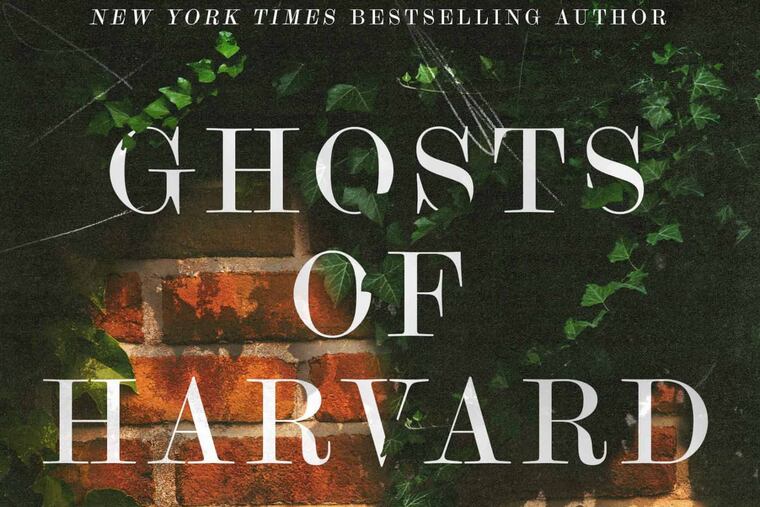Francesca Serritella makes a name for herself as a novelist with ‘Ghosts of Harvard’ | Book review
The author has been cowriting humorous essay collections with her mother, novelist (and Philadelphia Inquirer contributing columnist) Lisa Scottoline, for the past decade.

Ghosts of Harvard
By Francesca Serritella
Random House. 464 pp. $27
Reviewed by Maureen Corrigan
Whether it's nature or nurture, mystery writing seems to be a craft that can be passed down successfully from parent to child. Legal thriller writer C.W. Grafton begat Sue Grafton; Mary Higgins Clark begat Carol Higgins Clark; Tony Hillerman begat Anne Hillerman; and James Lee Burke begat Alafair Burke. Now a new young "begat" has begun writing suspense.
Francesca Serritella has been cowriting humorous essay collections with her mother, superstar novelist (and Inquirer contributing columnist) Lisa Scottoline, for the past decade. During that time, she’s also been working on a mystery. Serritella’s debut is a sweeping and beguiling novel called Ghosts of Harvard, which carries forward some of the tropes of her mother’s fiction but also ventures into territory that’s rarely explored these days: supernatural suspense.
When was the last time you read a mystery tale that featured ghosts as characters? I mean straightforwardly, without ultimately exposing the paranormal phenomenon as fraudulent. The only contemporary series I can think of is Mystery Grand Master Carolyn Hart’s charming Bailey Ruth Raeburn novels, about a ghostly sleuth who returns from The Great Beyond to crack cases in her hometown of Adelaide, Okla. Otherwise, as in The Hound of the Baskervilles or classic Nancy Drew adventures like The Ghost of Blackwood Hall and The Haunted Bridge, reason always triumphs over the supernatural.
Not so in Ghosts of Harvard. In Serritella’s eerie tale, the figure of the insecure-but-gutsy woman-in-trouble (a beloved staple of Scottoline’s stories), is plunked down into Harvard’s hallowed campus to solve a mystery tormenting her family. Along with the expected stressors of college life — including invasive roommates and an avalanche of course work — first-year student Cadence “Cady” Archer encounters a trio of lost souls who entered Harvard Yard ages ago and never left.
The opening sentence of Ghosts of Harvard clues readers in that the tone of this mystery will be more somber than Serritella’s essays: “Cady hadn’t set foot on Harvard’s campus since her older brother’s suicide.” Cady’s brother Eric, who’d been diagnosed with schizophrenia, jumped out the window of his Harvard apartment in his junior year. Before the onset of Eric’s illness, the siblings had been close, sharing a sense of humor and bright red hair. Against her devastated parents’ wishes, Cady, who was three years younger than Eric, was determined to follow in his footsteps and attend Harvard. Newly arrived on campus, Cady feels walled off from her more carefree classmates by her grief and by her secret mission to learn more about what pressures — and, perhaps, people at Harvard — pushed Eric over the edge.
Relying on a partially encoded notebook Eric kept during his last months, Cady begins investigating, but before she even can be christened by her first spilled vodka cranberry cocktail at her first “final club” party (which, to us non-Crimsons sounds like a tony name for a frat party), Cady is approached by a series of strange characters, living and dead. There’s Eric’s mentor, the elegant physics professor Mikaela Prokop, and Eric’s friend — and academic rival — a suave charmer named Nikos.
And then there are the spectral Others. Sitting silently through the first discussion session of her medieval history class, Cady is intimidated by the flashy erudition of her classmates, until she hears a voice in her ear whispering: “Don’t be so impressed … You’ll find that most people here are more adept at appearing intelligent than actually being so. They’re mostly dolts.” That disembodied voice of a reassuring (and, as it turns out, famous) Harvard grad from ages past is soon joined by two other voices: an enslaved woman named Bilhah, based on an actual woman who died in 1765 while “in service” in the Harvard president’s residence, and an earnest young man nicknamed “Whit,” who yearns to serve his country as an aviator. Are these the kind of auditory hallucinations that prefigure the onset of schizophrenia — which does run in families, after all — or are these ghosts appearing to Cady for reasons that may only become clear far too late?
Serritella, who is a Harvard grad herself, writes about the campus with an insider’s savvy. She takes readers on jaunts into forgotten graveyards and spooky “whispering wall” corners. Oddly, the one area where Serritella’s firsthand knowledge of Harvard falters is in some of the classroom scenes. Cady’s freshman English seminar professor sneers when she arrives late to class: “When you show up late in my class, it disrespects me … So it’s simple, every time you embarrass me, I’ll embarrass you. And trust me, I’m good at it.” In these days of mandatory faculty sensitivity training, were any prof to speak to a student this way, they would, rightly, be reprimanded.
Ghosts of Harvard is a rich, intricately plotted thriller that gathers suspense velocity as Cady runs through the mazelike halls of academe and the winding streets of Cambridge, chasing after clues to the more sinister circumstances of Eric’s death. It’s a testament to Serritella’s sure touch that when Cady’s ghostly companions ultimately make their final departures, Harvard seems duller.
Corrigan, who is the book critic for the NPR program “Fresh Air,” teaches literature at Georgetown University. She wrote this for the Washington Post.